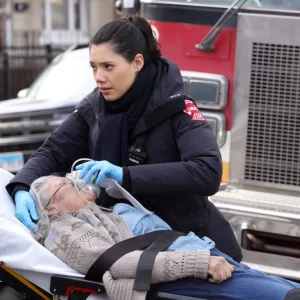NBC’s iconic “One Chicago” universe — the emotionally charged trifecta of Chicago Fire, Chicago Med, and Chicago P.D. — is facing major behind-the-scenes changes. While fans eagerly anticipate new episodes filled with high-stakes rescues, life-or-death surgeries, and gritty police work, the network’s recent cost-cutting strategy has cast a long shadow over the franchise.
The decision, part of a broader financial restructuring across NBCUniversal, has sparked concern and curiosity among viewers and industry insiders alike. What will these cuts mean for the shows’ futures? Will it impact cast members, storylines, or the overall look and feel of the series? The “One Chicago” shows, which have been mainstays on the network for over a decade, command large ensemble casts, film on-location in Chicago, and rely heavily on action-packed scenes that are expensive to produce. While the franchise continues to perform well in terms of ratings, the cost of keeping three major productions afloat year-round is substantial.
While some fans might worry about having “less show,” others see a potential silver lining: tighter scripts, fewer filler episodes, and more impactful story arcs. Still, longtime viewers who have come to cherish weekly visits to Chicago’s emergency rooms, firehouses, and police precincts may feel the loss of those extra episodes. Chicago P.D. already saw the emotional exit of Tracy Spiridakos (Hailey Upton) in 2024, and rumors suggest more cast shake-ups could be on the horizon. Actors with long tenures and higher salaries may be featured in fewer episodes or be written out entirely to cut costs.

On Chicago Med, budget constraints may push the writers to focus on a tighter core of hospital staff, with less screen time for recurring characters. Meanwhile, Chicago Fire may lean on newer, less expensive characters, with veterans appearing more sporadically throughout the season. NBC executives reportedly hope to balance budget with audience loyalty, ensuring any departures are meaningful and narratively justified — but it’s clear that 2025 will bring a very different dynamic to the shows’ ensemble casts.
Expect fewer large-scale action sequences, such as fiery building rescues or explosive police raids, which require multiple permits, stunts, extras, and special effects. Instead, shows may rely more heavily on character-driven scenes set indoors or in controlled environments. That’s not necessarily bad news. Fans of the franchise love it for the interpersonal drama just as much as the adrenaline-fueled action. With tighter scripts and smaller scenes, writers may double down on emotional storytelling — relationships, moral dilemmas, personal growth — and give longtime characters more depth.
One of the most exciting hallmarks of the “One Chicago” franchise has been the epic crossover events, where characters from Fire, Med, and P.D. interact in thrilling, multi-part storylines. These episodes are often fan favorites and bring in big viewership numbers. Coordinating three full production teams, multiple scripts, and complex timelines is a logistical — and financial — challenge. While occasional cameo appearances across shows may still happen, full-blown crossover episodes are unlikely in 2025. NBC is expected to focus instead on telling strong, self-contained stories within each show, with only light narrative threads connecting the three series.





